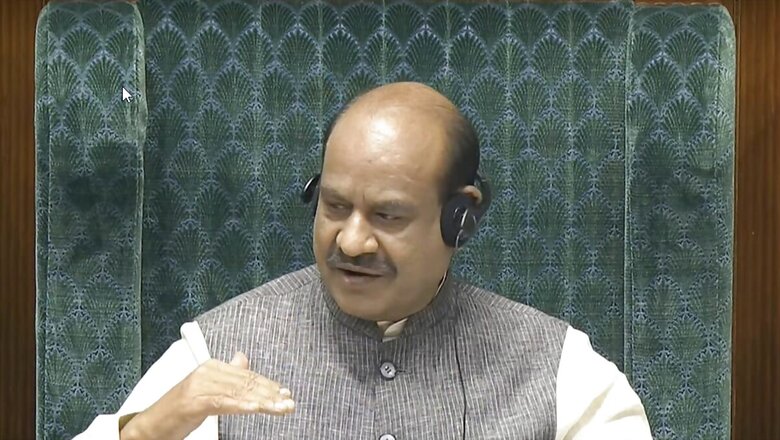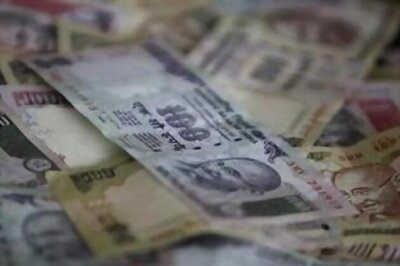
views
The contemporary political landscape in India, like in many democracies worldwide, is seeing an increasing trend towards polarisation. Everyday political discourse has become entrenched in divisionism, with party lines growing sharper, making bipartisan engagement a rarity.
This is evident in the recent observations of Lok Sabha speaker Om Birla, where he stated how “presiding officers should maintain continuous and consistent dialogue across parties and set new standards for politics”. Birla believes that the traditions and systems of Parliament and state legislatures should foster a sense of Indianness to realise the vision of ‘Ek Bharat, Shreshtha Bharat’. Birla’s comments point us in the direction of ancient Indian discourse, which was founded in samvad (dialogue), not vivaad (dispute), in encouraging mutual debates to further mutual understanding of the persistent problems of governance.
In the past, Indian parliamentarians had the opportunity to contest ideas without getting embroiled in conflict on several matters of national interest. Such interactions largely took place in informal settings — conversations over tea or coffee during session breaks at the Central Hall in the old Parliament being a prominent example — facilitating understanding, even empathy, across ideological divides. However, today’s politics in India seems to have lost that spirit of amicable exchange. Political identities have become stringent, straitjacketing representatives who are hesitant to associate with members from opposing parties for fear of undue criticism. So much so that politicians can go to great lengths to avoid being photographed alongside their political opponents at public events.
Worryingly, this trend in Indian politics mirrors the divisive political climate in the United States, where Democrats and Republicans are invariably at daggers drawn, as if they are congenitally disposed to disagree with each other. Such disagreements frequently become vitriolic, with ad hominem attacks vitiating an atmosphere where political violence feels inevitable. A few years ago, Arun Jaitley had used the phrase “compulsive contrarianism” to describe the reflexive opposition parties’ display towards one another. Policies proposed by one party are opposed by others based not on merit but purely on the grounds of political rivalry.
However, Indian modern history shows that some of the country’s most consequential policies in the 21st century — the Aadhaar programme, the Goods and Services Tax (GST), and the National Pension Scheme (NPS) — have been carried across regimes with valuable inputs from multiple parties. This highlights the importance of bipartisan collaboration in ensuring long-term progress and stability. Standing in 2024, more than seven decades after Independence, the need for a dedicated platform to encourage bipartisan political dialogue in India has never been more urgent.
One potential solution to India’s growing political divide is the creation of a neutral, apolitical forum where parliamentarians and policymakers can come together to discuss critical sectors such as healthcare, technology and education — areas that directly impact citizens’ lives and should not be held hostage to partisan bickering. Universities, known for promoting critical thinking, could provide the perfect setting for such an initiative. MIT World Peace University (MIT-WPU) in Pune, with its long-standing commitment to promoting peace and dialogue, stands out as an ideal candidate for facilitating these bipartisan discussions.
Established with a vision to bring about social transformation through education, MIT-WPU has a history of engaging students, academics and professionals in conversations that expand the political horizon. Its founder president, Prof Dr Vishwanath D Karad, believes MIT-WPU’s philosophy is coherent with Swami Vivekananda’s quest for spirituality, which can only be achieved by sharing and integrating knowledge. The university’s programmes already emphasise global citizenship, leadership and ethics, making it a natural extension to include political leaders in its dialogue-driven initiatives. It is also the first university of its kind in India to offer a two-year, full-time Master’s programme in political leadership and governance. By creating a bipartisan platform, MIT-WPU can provide a space for policymakers from all parties to congregate, exchange ideas and work towards common goals.
In 2023, MIT-WPU hosted the first edition of an innovative National Legislators’ Conference Bharat (NLC Bharat) where Members of Legislative Assemblies (MLAs) and Members of Legislative Councils (MLCs) across the nation gathered at one place to exchange ideas. The meet saw many MLAs signing a memorandum of understanding (MoU) to establish a collaborative partnership with old constituency wise Vidhayak Yuva Sansad (MLA’s Youth Parliament). As a follow-up of NLC Bharat, 40 MLAs participated at NCSL legislative Summit in Louisville, Kentucky in August 2024 to engage with global counterparts and share legislative challenges across borders.
Rahul V Karad, founder convenor of NLC, says that elected representatives cutting across party lines need a forum to deliberate upon challenges of governance, improvements needed in electioneering and our political system. “The paths might be different but all of our destinations are the same and that is the development of the country,” Karad said, emphasising again: “Even though we come from different ideologies and walk in different paths, our destination is one — nation building and progress.”
This conference aligns with the need for more bipartisan politics in India, where the younger generation of leaders is mostly disillusioned by the political establishment. Many aspiring political leaders are discouraged from pursuing public service because of the toxic environment and the rigidity of party lines. A bipartisan platform could help change this by accelerating constructive political engagement and proving that politics can be about collaboration, not just competition. A university-backed forum could also attract young politicians by emphasising values like ethical leadership, national development and the common good, which go beyond party politics.
India’s political history provides examples of leaders who have effectively bridged the political divide. Jawaharlal Nehru, India’s first Prime Minister, often spoke about the importance of debate and dialogue, saying, “Democracy is good. I say this because other systems are worse.” Nehru believed that healthy, respectful disagreements were essential to a functioning democracy, but he also recognised the need for cooperation on critical issues. Similarly, former Prime Minister Atal Bihari Vajpayee was a champion of bipartisanship, famously stating, “The political game will always continue. Political parties will come and go. Parties will form and break. But the country must remain. The country’s democracy must remain eternal.” Both leaders exemplified a commitment to national unity and working across party lines to achieve shared objectives.
In today’s political landscape, the absence of such collaborative efforts is felt more acutely than ever. By creating a platform where politicians can participate in meaningful conversations about apolitical sectors such as health, education and technology, MIT-WPU can help depolarise Indian politics. The stakes are high, but the potential benefits are immense.
Constructive bipartisan dialogue can lead to more robust policies that are sustainable across regimes, ensuring continuity and long-term impact. The issues India faces today, from public health crises to rampant inequality to the challenges of technological innovation, require collaborative solutions that transcend party politics. More importantly, we need a new generation of leaders who are committed to collaboration and constructive debate, ensuring that India continues to progress toward a more inclusive and united future. As the likes of Nehru and Vajpayee demonstrated, it is possible to engage across political lines while remaining committed to one’s principles. It is time for India to reclaim that legacy.
The author is a Visiting Fellow at the Observer Research Foundation. A well-known political analyst, he has written several books, including ‘24 Akbar Road’ and ‘Sonia: A Biography’. Views expressed in the above piece are personal and solely those of the author. They do not necessarily reflect News18’s views.


















Comments
0 comment